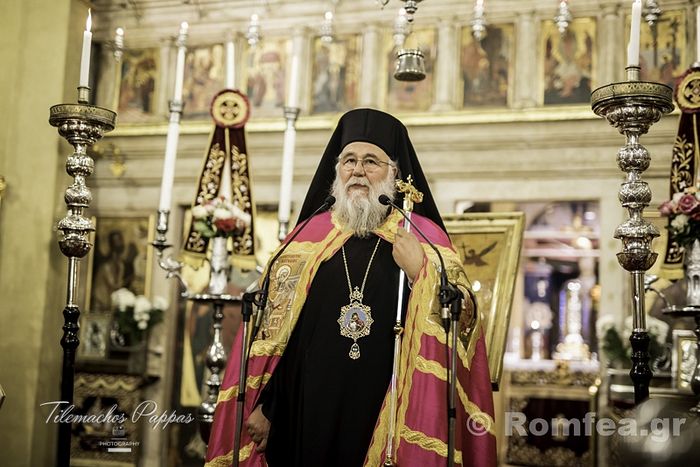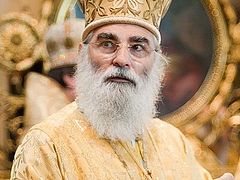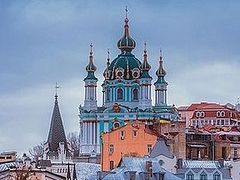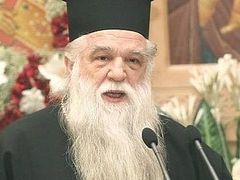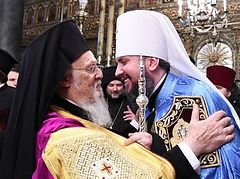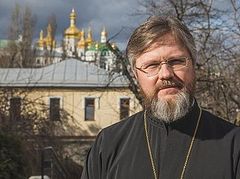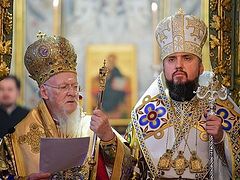Corfu, Greece, October 11, 2019
His Eminence Metropolitan Simeon of New Smyrna recently issued a letter to the hierarchs of the Greek Orthodox Church, urging them not to make any hasty decision on the Ukrainian issue at tomorrow’s extraordinary session of the Bishops’ Council, where they will hear and deliberate upon a report and recommendation on the matter from His Beatitude Archbishop Ieronymos of Athens.
Now another hierarch, His Eminence Metropolitan Nektarios of Corfu, has addressed his brother hierarchs, calling on them to postpone any decision on the Ukrainian issue, reports Romfea.
Met. Nektarios begins his letter noting that he will not be able to attend tomorrow’s session because he already committed to taking the right hand of St. Spyridon to Bucharest for the feast of St. Parascheva—one of the most important feasts for Romanian Orthodox Christians. Met. Nektarios will remain in Romania with the precious relic until October 17.
However, “I would like my position on the Ukrainian question to be made known to the hierarchy,” he writes.
“Because I do not think the time is right to take a decision on this thorny issue and because geopolitical conditions in the wider region are not ideal, with the result that any decision is likely to cause difficulties in our country, I believe that we should postpone this decision,” the Greek hierarch writes.
His sentiment echoes that expressed last month by Metropolitan Seraphim of Kythira, who said: “A hasty decision under pressure from secular leaders, the powers of the world, to advance geopolitical and geo-strategic projects, has deeply divided the Ukrainian people, it has divided the autocephalous Orthodox Churches, because they all together do not agree with the non-canonical granting of autocephaly to Ukraine, it has divided the Standing Holy Synod, it has divided the Holy Mountain, it has divided the Bishops’ Council.”
Met. Nektarios continues by noting that not all of the Churches that come before Greece in the diptychs have made statements yet, and therefore they should not rush the Church of Greece. The Churches that are higher in the diptychs but have made no Synodal statements on the matter include Alexandria, Jerusalem, Georgia, and Bulgaria, though primates and various hierarchs from those Churches have made statements on the Ukrainian issue.
Finally, the hierarch of Corfu suggested that the Greek Church take a mediating role in the matter and help realize a dialogue between the Patriarchate of Constantinople and the Russian Orthodox Church. Archbishop Chrysostomos of Cyprus was attempting to play a mediating role and met with several of his brother primates, though he stopped because his activity angered Patriarch Bartholomew.
Met. Nektarios has addressed the Ukrainian issue before, expressing his dismay at what is happening there, and his unwavering support for the canonical Church headed by His Beatitude Metropolitan Onuphry of Kiev and All Ukraine.
In December 2018, the Greek hierarch told Metropolitan Hilarion of Volokolamsk, the head of the Moscow Patriarchate’s Department for External Church Relations, that Constantinople’s holding of the “unification council” on December 15 and the creation of a new church on someone else’s ecclesiastical territory is a scandal for the entire Orthodox world, while noting that the only Church in Ukraine recognized in the Orthodox world is that headed by Met. Onuphry.
The creation of a new church out of two schismatic groups should have been preceded by a serious study of the apostolic succession and canonicity of the groups, he said. The lack of sacramental grace and apostolic succession of the “Kiev Patriarchate” and “Ukrainian Autocephalous Orthodox Church” have proven to be a major issue for several Local Churches, which have declared that they cannot acknowledge such “clergy.”
In September of this year, the canonical hierarch of Odessa, Metropolitan Agafangel, visited Met. Nektarios on Corfu, who emphasized again that, “We recognize only one canonical Church, headed by Metropolitan Onuphry of Kiev and All Ukraine, who often came here to the island of Corfu to serve as a simple priest.”

